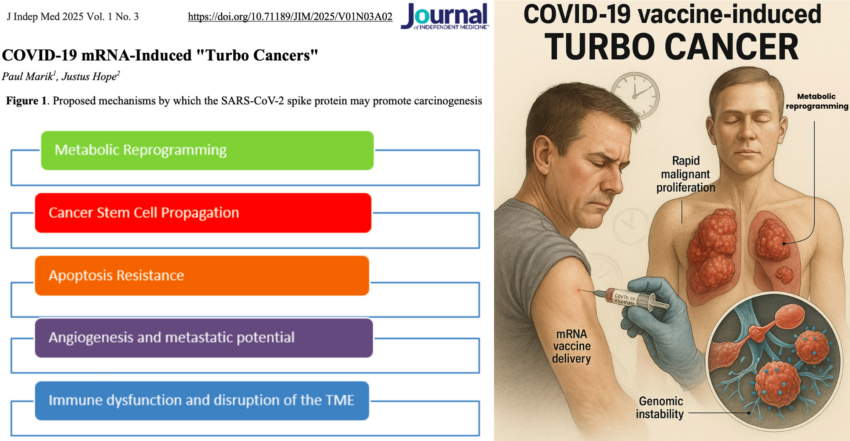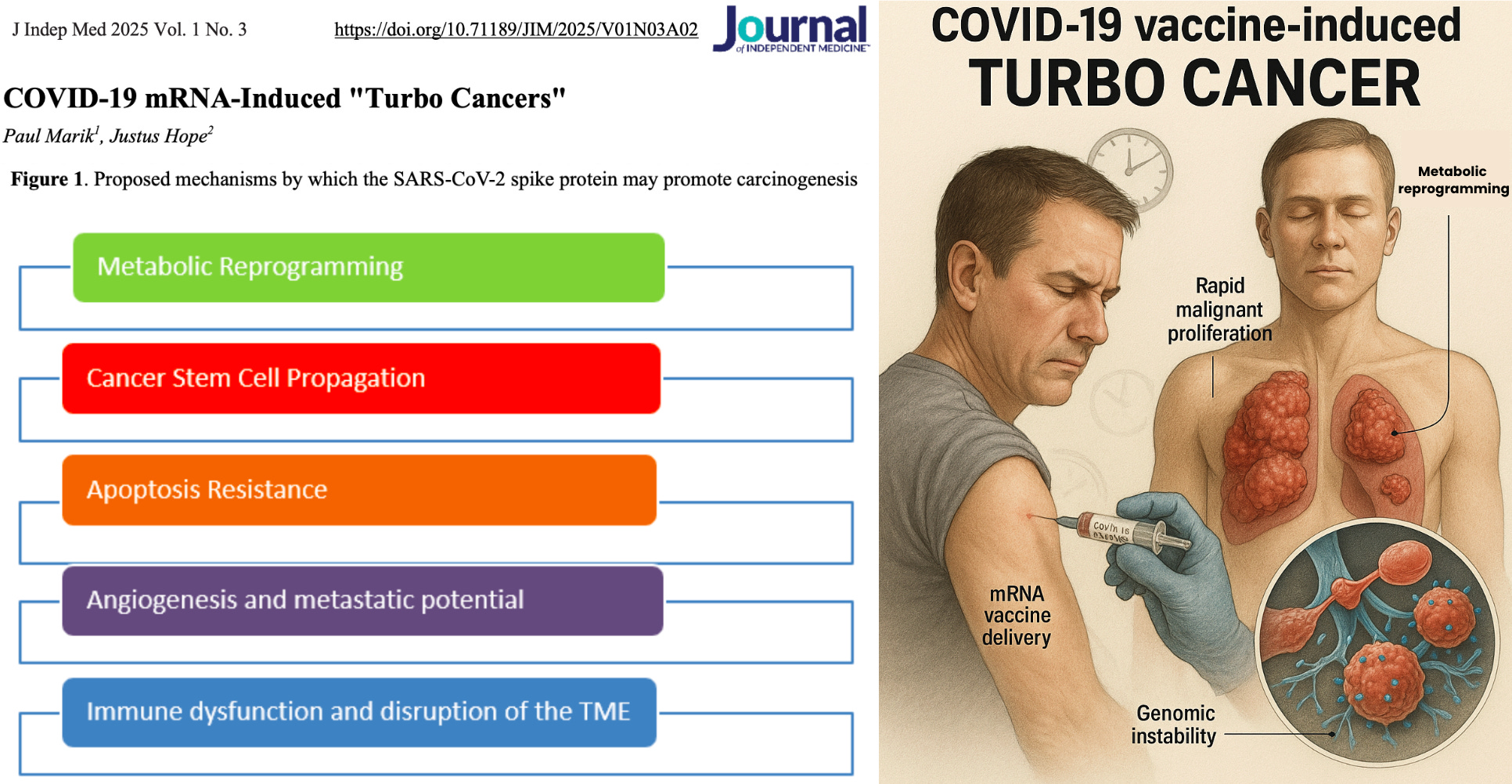For years, “turbo cancer” was a term ridiculed as an anti-vaccine conspiracy theory. Health authorities, mainstream outlets, and even Wikipedia insisted there was “no evidence” such a phenomenon existed.
However, a recent literature review outlined over 100 peer-reviewed studies indicate that mRNA injections may cause or accelerate cancer via 17 distinct biological mechanisms:
Now, for the first time, a peer-reviewed scientific article titled, COVID-19 mRNA-Induced “Turbo Cancers”, has been published in the Journal of Independent Medicine that formally defines “turbo cancer” and compiles the growing body of clinical cases, epidemiological signals, and mechanistic pathways explaining how COVID-19 mRNA shots and the spike protein may drive sudden, aggressive, treatment-resistant cancers:
Turbo Cancers Defined
-
Turbo cancers are defined as unusually aggressive, rapidly progressing malignancies.
-
They are marked by sudden relapses in patients previously in remission and new onset in younger individuals at advanced stages.
Epidemiological Red Flags
-
Data from the US, UK, and Japan show abrupt increases in cancer incidence and mortality beginning in 2021, tracking with mass vaccination campaigns.
-
VAERS analysis reveals the most disproportionate reports involve appendix, breast, colorectal, endometrial, laryngeal, and liver cancers.
Mechanistic Pathways Identified
The SARS-CoV-2 spike protein disrupts fundamental cancer defense systems, including:
-
Metabolic reprogramming (forcing cells into cancer-like energy production).
-
Apoptosis resistance (interfering with p53 and BRCA1 tumor suppressors).
-
Cancer stem cell activation (via Wnt, Notch, NF-κB, and estrogen receptor pathways).
-
Angiogenesis and metastasis (through VEGF, MMP9, and Galectin-3 mimicry).
-
Immune evasion (IgG4 induction, lymphopenia, NK-cell suppression).
Hidden Oncogenic Risks in the Shots
-
EBV reactivation following boosters.
-
SV40 DNA promoter sequences detected in vaccine vials.
-
N1-methyl-pseudouridine (m1Ψ) shown to accelerate tumor growth in models.
-
Possible reverse transcription and genomic integration of mRNA.
High-Risk Populations
-
Cancer survivors in remission.
-
Individuals with strong family history of malignancy.
-
The elderly (75+).
-
Those receiving multiple booster doses.
Proposed Preventive Approach
-
Authors recommend the ROOT4 protocol: EGCG (green tea extract), curcumin, vitamin D, and omega-3 fatty acids — as a low-cost, safe cancer prophylaxis for high-risk individuals.
As the authors conclude:
The emergence of turbo cancers following COVID- 19 vaccination—marked by unusually aggressive behavior, relapse in remission cases, and occurrence in younger individuals—represents a concerning clinical pattern that warrants urgent scientific scrutiny. While mainstream discourse has largely dismissed these cancers as coincidental or biologically implausible, the mechanistic data presented in this review suggest otherwise. The SARS-CoV-2 spike protein may interfere with core regulatory pathways of carcinogenesis, including metabolic reprogram- ming, immune surveillance, apoptosis resistance, and stem cell proliferation.
It’s time for world governments and public health agencies to stop denying reality: COVID-19 mRNA-induced “Turbo Cancers” are real.
Epidemiologist and Foundation Administrator, McCullough Foundation
www.mcculloughfnd.org
Please consider following both the McCullough Foundation and my personal account on X (formerly Twitter) for further content.
Click this link for the original source of this article.
Author: Nicolas Hulscher, MPH
This content is courtesy of, and owned and copyrighted by, https://petermcculloughmd.substack.com and its author. This content is made available by use of the public RSS feed offered by the host site and is used for educational purposes only. If you are the author or represent the host site and would like this content removed now and in the future, please contact USSANews.com using the email address in the Contact page found in the website menu.









